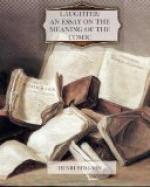Instead of taking up these varieties in detail, we prefer to lay stress upon what they have in common. In the forefront we find professional vanity. Each one of M. Jourdain’s teachers exalts his own art above all the rest. In a play of Labiche there is a character who cannot understand how it is possible to be anything else than a timber merchant. Naturally he is a timber merchant himself. Note that vanity here tends to merge into solemnity, in proportion to the degree of quackery there is in the profession under consideration. For it is a remarkable fact that the more questionable an art, science or occupation is, the more those who practise it are inclined to regard themselves as invested with a kind of priesthood and to claim that all should bow before its mysteries. Useful professions are clearly meant for the public, but those whose utility is more dubious can only justify their existence by assuming that the public is meant for them: now, this is just the illusion that lies at the root of solemnity. Almost everything comic in Moliere’s doctors comes from this source. They treat the patient as though he had been made for the doctors, and nature herself as an appendage to medicine.
Another form of this comic rigidity is what may be called professional callousness. The comic character is so tightly jammed into the rigid frame of his functions that he has no room to move or to be moved like other men. Only call to mind the answer Isabelle receives from Perrin Dandin, the judge, when she asks him how he can bear to look on when the poor wretches are being tortured: Bah! cela fait toujours passer une heure ou deux.
[Footnote: Bah! it always helps to while away an hour or two.]
Does not Tartuffe also manifest a sort of professional callousness when he says—it is true, by the mouth of Orgon: Et je verrais mourir frere, enfants, mere et femme, Que je m’en soucierais autant que de cela!
[Footnote: Let brother, children, mother and wife all die, what should I care!]
The device most in use, however, for making a profession ludicrous is to confine it, so to say, within the four corners of its own particular jargon. Judge, doctor and soldier are made to apply the language of law, medicine and strategy to the everyday affairs of life, as though they had became incapable of talking like ordinary people. As a rule, this kind of the ludicrous is rather coarse. It becomes more refined, however, as we have already said, if it reveals some peculiarity of character in addition to a professional habit. We will instance only Regnard’s Joueur, who expresses himself with the utmost originality in terms borrowed from gambling, giving his valet the name of Hector, and calling his betrothed Pallas, du nom connu de la Dame de Pique; [Footnote: Pallas, from the well-known name of the Queen of Spades.] or Moliere’s Femmes savantes, where the comic element evidently consists largely in the translation of ideas of a scientific nature into terms of feminine sensibility: “Epicure me plait...” (Epicurus is charming), “J’aime les tourbillons” (I dote on vortices), etc. You have only to read the third act to find that Armande, Philaminte and Belise almost invariably express themselves in this style.




